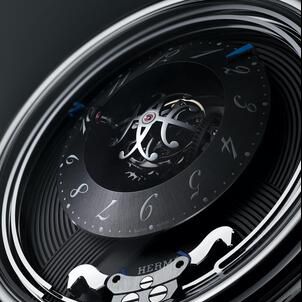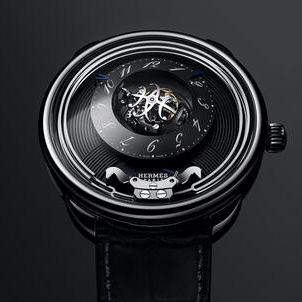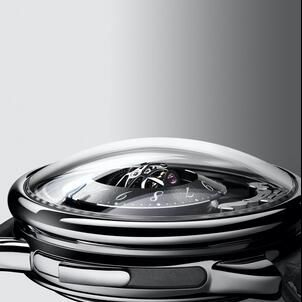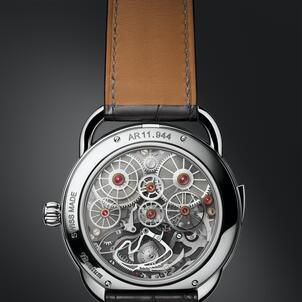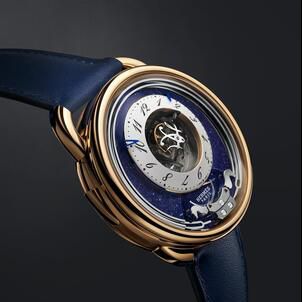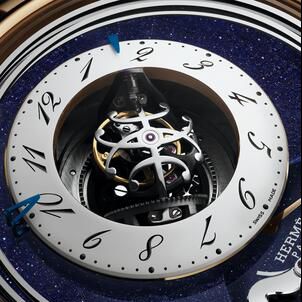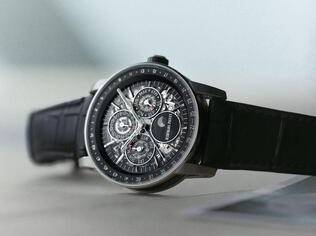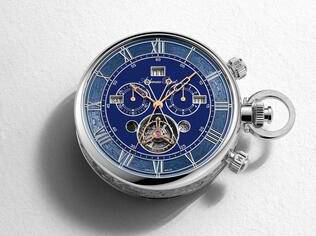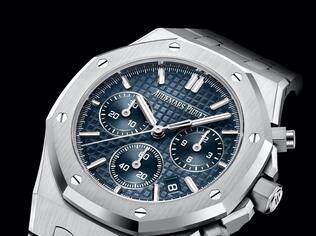
- BEST IN ONLINE MEDIA (MAGAZINE)
- 2013 & 2010 GOLD AWARD WINNER
- ASIAN DIGITAL MEDIA AWARDS
- WEBSITE OF THE YEAR - GOLD
- MULTIMEDIA PROJECT OF THE YEAR
- 2017 MPAS AWARDS
ASIA'S PREMIER LUXURY & LIFESTYLE MAGAZINE
SENATUS.NET
 | 12 April 2024
| 12 April 2024
Hermès steals the show with a grand complication release this Watches & Wonders 2024, in what is highly like a GPHG contender. The Arceau Arceau Duc Attelé features a unique combination of tri-axial tourbillon and a minute repeater.
To house these features, the Arceau watch is best placed. Designed by Henri d’Origny in 1978, its round shape with asymmetrical stirrup lugs is reinvented with the inherent ease of a resolutely timeless model. The understated yet distinctive 43 mm polished titanium or rose gold case of the Arceau Duc Attelé highlights the alliance between Hermès style and expertise. The central triple-axis tourbillon and the ‘tuning-fork’ minute repeater are in harmony with the Hermès world of Haute Horlogerie and equestrian aesthetics.
The association of these two major complications with a high-frequency movement – a first – is revealed at the heart of the watch, where every technical and stylistic detail reveals its share of unexpected details and meticulous care. On the dial side, a sapphire dome tops the tri-axial tourbillon and its mirror-polished double H-shaped titanium carriages. Representing initials of the founding couple, Émile Hermès and Julie Hollande, these intertwined letters echo the ironwork adorning the lift in the original Parisian boutique at 24 Rue du Faubourg-Saint-Honoré. Embodying a feat of mechanical miniaturisation, this tourbillon featuring three cages, axes and speeds of rotation operating within a curved, eccentric hour-circle. The hours-minutes display is punctuated by Arabic numerals inclined like a galloping horse. To enhance the visibility of this horological achievement, claw-shaped hands appear around the rim of the chapter ring. Their blue hue complements the 48-hour power reserve indicator appearing at the base of the dial.
Evoking sound-wave propagation, the dynamic striped guilloché decoration of the titanium model echoes the minute repeater hammers sculpted in the shape of a horse. Chiming the hours, quarters and minutes via a dedicated slide on the side of the case, they strike the elongated U-shaped branches of the long hardenedsteel gong visible around the edge of the dial, whose rich tones are also reminiscent of cathedral chimes. This ‘tuning fork’ structure ensures optimal resonance, amplified by the material used for the case that is both lightweight and endowed with excellent acoustic properties.
Hand-wound via the 3 o’clock crown, the Arceau Duc Attelé watch beats to a precise rhythm thanks to its Manufacture H1926 movement equipped with a high-frequency balance. The reference refers to the year in which major renovation work was completed at the Paris boutique on the Faubourg Saint-Honoré. All this can be admired through a sapphire caseback inviting observers to contemplate a singular décor. The remarkable gears feature a cut-out design inspired by the wheels of the Duc attelé: a canopy-top four-wheeled carriage drawn by two horses. Inspired by a drawing that is the work of 19th century French animal painter and master of equestrian art Alfred Dreux, this tribute to the House’s identity was acquired by Émile Hermès in 1920.
The mainplate and bridges of Calibre H1926 feature an anthracite PVD treatment accentuating the light colour of the chiming mechanism, its horse head-and-mane racks and its toothed wheels picked up from the Hermès carriage. The openworked sapphire-crystal strikework bridge further enhances the sound of the minute repeater while revealing the movement's hand-finishing, its gold chatons, generous jewels and mirror-polished screws. Available in titanium or rose gold versions – each issued in a numbered 24-piece limited edition – the Arceau Duc Attelé watch is paired with a mattanthracite or matt abyss blue alligator strap crafted in the Hermès Horloger workshops.
SENATUS is a registered trademark of SENATUS PTE LTD. The material on this site may not be reproduced, distributed, transmitted, cached or used otherwise, except as expressly permitted in writing by SENATUS.

